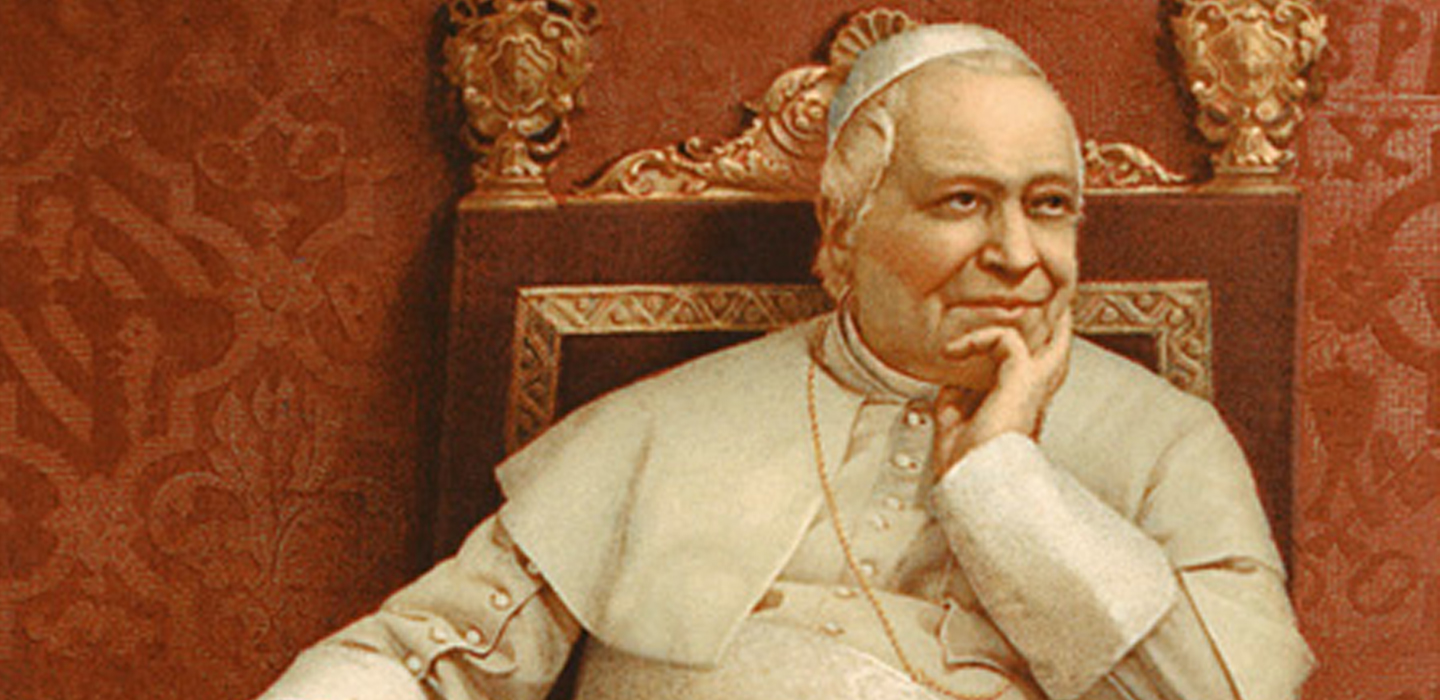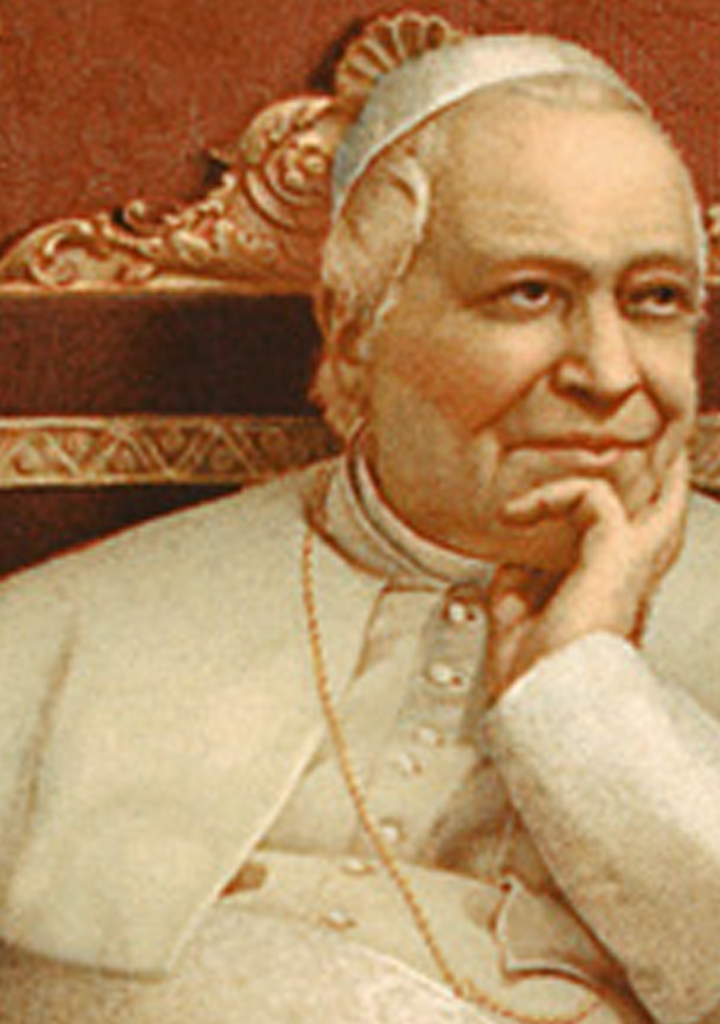

INCLYTUM PATRIARCHAM
Pope Pius IX traces the history of the liturgies honoring St. Joseph
and gives some guidelines on the celebrations of his feast
July 7, 1871
“
He indeed enriched him and filled him to overflowing with entirely unique graces, enabling him to execute more faithfully the duties of so sublime a state.
The Catholic Church rightly honors with a very full cultus and venerates with a feeling of deep reverence the illustrious patriarch blessed Joseph, now crowned with glory and honor in heaven. On earth, the Almighty God, in preference to all His saints, willed him to be the chaste and true spouse of the Immaculate Virgin Mary as well as the putative father of His only-begotten Son. He indeed enriched him and filled him to overflowing with entirely unique graces, enabling him to execute more faithfully the duties of so sublime a state.
Wherefore, the Roman Pontiffs, Our Predecessors, in order that they might daily increase and more ardently stimulate in the hearts of the Christian faithful a reverence and devotion toward the holy patriarch, and that they might exhort them to implore his intercession with God with the utmost confidence, have not failed to decree new and ever greater tokens of public veneration for him whenever the occasion was fitting.
Among these let it suffice to call to mind Our predecessors of happy memory, Sixtus IV, who wished the feast of St. Joseph inserted in the Roman missal and breviary; Gregory XV, who by a decree of May 8, 1621, ordered that the feast should be observed in the whole world under a double precept; Clement X, who on December 6, 1670, accorded the feast the rite of a double of the second class; Clement XI, who by a decree of February 4, 1714, adorned the feast with a complete proper mass and office; and finally Benedict XIII, who by a decree published on December 19, 1726, ordered the name of the holy patriarch added to the Litany of the Saints.
We Ourselves, raised to the supreme Chair of Peter by the inscrutable design of God, and moved by the example of Our illustrious predecessors, as well as by the singular devotion which from youth itself We entertained toward the holy patriarch, have with great joy of the soul, by a decree of September 10, 1847, extended to the whole Church under the rite of double of the second class the feast of his patronage, a feast which has already been celebrated in many places by a special indult of the Holy See.
However, in these latter times in which a monstrous and most abominable war has been declared against the Church of Christ, the devotion of the faithful toward St. Joseph has grown and progressed to such an extent that from every direction innumerable and fervent petitions have reached Us. These were recently renewed during the Sacred Ecumenical Council of the Vatican by groups of the faithful, and, what is more important, by many of Our venerable brethren, the cardinals and bishops of the Holy Roman Church.
In their petitions they begged of Us that in these mournful days, as a safeguard against the evils which disturb us on every side, We should more efficaciously implore the compassion of God through the merits and intercession of Saint Joseph, declaring him Patron of the Universal Church. Accordingly, moved by these requests and after having invoked the divine light, We deemed it right that desires in such numbers and of such piety should be granted.
Hence, by a special decree of Our Congregation of Sacred Rites (which We ordered to be proclaimed during high mass in Our patriarchal basilicas, the Lateran, Vatican and Liberian, on December 8, of the past year 1870, the holy day of the immaculate conception of his spouse) We solemnly declared the blessed patriarch Joseph patron of the universal church, and We ordered that his feast occurring on the 19th of March should henceforth be celebrated in the whole world under the rite of a double of the first class, yet without an octave on account of Lent.
Now, after our declaration of the holy patriarch as patron of the universal church, We think it but proper that in the public veneration of the church each and every privilege of honor should be accorded him which belongs to special patron saints according to the general rubrics of the Roman breviary and missal. Therefore, after consultation with Our venerable brethren, the cardinals of the holy Roman church who are entrusted with the supervision of the sacred rites, We, confirming and also amplifying with Our present letter the aforesaid regulation of that decree, do command and enjoin the following:
We desire that the Creed be always added in the mass on the natal feast of St. Joseph as well as on the feast of his patronage, even though these feasts should occur on some day other than Sunday. Moreover, we desire that in the oration A Cunctis, whenever it is to be recited, the commemoration of St. Joseph shall be added in the following words, “with blessed Joseph,” which words are to be introduced after the invocation of the Blessed Virgin Mary and before all other patron saints, with the exception of the angels and of St. John the Baptist.
Finally, we desire that, while this order is to be observed in the suffrages of the saints whenever they are prescribed by the rubrics, the following commemoration should be added in honor of St. Joseph:
The Antiphon at Vespers:
Behold the faithful and prudent servant whom the Lord has set over his household.
V. Glory and riches are in his house.
R. And his justice remains for ever.
The Antiphon at Lauds:
Jesus himself, when he began his work, was about thirty years of age, being as was supposed the son of Joseph.
V. The mouth of the just man shall meditate wisdom.
R. And his tongue shall speak judgment.
The Oration:
O God, who in your ineffable providence was pleased to choose blessed Joseph as the spouse of your most holy mother, grant, we beseech you, that we may be made worthy to have him for our intercessor in heaven whom we venerate as our protector on earth.
Given in Rome at St. Peter‘s, under the Fisherman‘s Seal, July 7, 1871, the twenty-sixth year of our pontificate.
Close